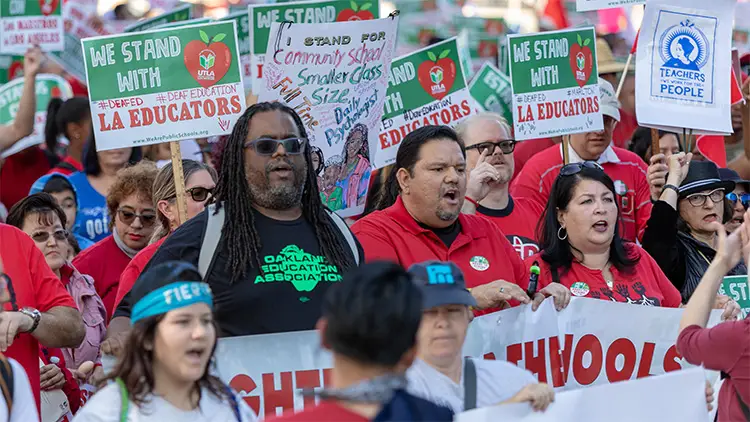The rhetoric of teacher strikes in Los Angeles, likely coming to a town near you, has familiar elements and fantasy ones. Along with well-founded messages about higher wages and more support for schools, unions campaign against privatization and billionaire takeover of schools, two events that exist mostly in their message gurus’ imagination.
True, in many of the cities where strikes are brewing, more and more families are choosing charter schools, in which increasing numbers get teacher training and management help from foundation-funded nonprofits. Charter enrollment has grown in big cities because increasing numbers of low-income families of color trust them with their children, and the schools work in part because of support from foundation-funded networks like KIPP, Summit, and Green Dot.
Unions oppose charter school growth because it threatens to reduce their membership, and therefore power. But teachers are far from united on the subject, with many willing to work in charter schools (if the schools can afford them) and to enroll their own children in the best ones.
The “privatization” and “billionaire takeover” framings use the classic propaganda technique of attaching emotionally charged labels to more neutral events. Thanks to President Trump’s rhetoric on immigration, we are now all too familiar with this.
Anti-charter groups circulate former Labor Secretary Robert Reich’s good short video on privatization, ignoring the fact that he defines it as giving a public asset over to for-profit organizations that run them to enhance the corporate bottom line. Reich emphasizes the need to govern charter schools in the public interest, but doesn’t directly apply the “privatization” label to them.
By his sensible and generally accepted definition, charter schools are not privatization at all. They are nonprofit organizations whose receipt of government funds is contingent on their showing benefits to children. Moreover, they must demonstrate that all the government funds they receive are used to fulfill their educational mission. And when they aren’t, their leaders can face criminal penalties.
Charter opponents have stretched the definition out of shape to suit their purposes.
The “billionaire takeover” label also doesn’t fit the facts. Charters are run by unpaid nonprofit boards whose membership is approved by the school board or state agency that authorizes them. True, the best-known groups of charter schools receive grants from foundations, whose funds ultimately come from wealthy individuals. But the billionaires living and dead behind these foundations don’t control the charter schools or other groups, like Teach for America, that promote charter school quality.
Local union heads and rank and file strike leaders are starting to use these polarizing terms, which Diane Ravitch developed over the past few years. Doing a complete turnabout after decades as a school choice advocate (and urging foundations to support charters), Prof. Ravitch learned that it’s much easier to raise outrage over “billionaire boys clubs” and “privatization” than against new schools serving poor kids. In the current state of political warfare, foundations funded by billionaires have become enemies of convenience.
Of course, saying it doesn’t make it so. Billionaires don’t profit from charter schools, or control them. There are foundations on all sides of the charter school debate. The Gates and Walton foundations, charter members of Ravitch’s billionaire boys club, have given hundreds of millions to school districts and community groups that support traditional public schools. They don’t control those organizations either.
Truthful messages—charter schools are not all good, their authorizers don’t always regulate them properly, and foundations don’t always use their money in the smartest way—just wouldn’t fire up parents and teachers. And the real causes of the financial distress that worsened working conditions for L.A. teachers—decades of declining enrollment, a district office that added staff as though continued growth was inevitable, retiree benefits that created an unsustainable financial burden—implicate a wide range of groups, including unions, that would be harder to rally the public against.
However, as the L.A. strike outcome shows, unions win on real issues about teacher pay, support for kids, and higher state funding for all schools. Charter school teachers, parents, and operators share these concerns. The themes about privatization and billionaire influence get attention, but not results.





